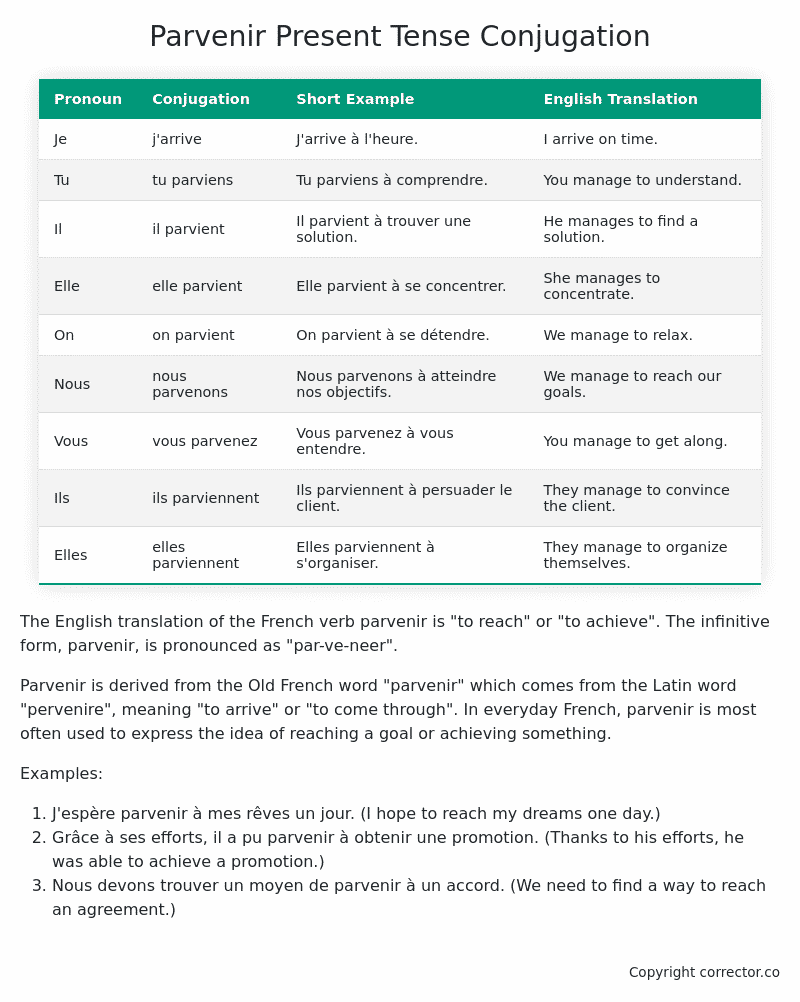Le Present (Present Tense) Conjugation of the French Verb parvenir
Introduction to the verb parvenir
The English translation of the French verb parvenir is “to reach” or “to achieve”. The infinitive form, parvenir, is pronounced as “par-ve-neer”.
Parvenir is derived from the Old French word “parvenir” which comes from the Latin word “pervenire”, meaning “to arrive” or “to come through”. In everyday French, parvenir is most often used to express the idea of reaching a goal or achieving something.
Examples:
- J’espère parvenir à mes rêves un jour. (I hope to reach my dreams one day.)
- Grâce à ses efforts, il a pu parvenir à obtenir une promotion. (Thanks to his efforts, he was able to achieve a promotion.)
- Nous devons trouver un moyen de parvenir à un accord. (We need to find a way to reach an agreement.)
Parvenir – About the French Present Tense
To take a deep dive into all the French tenses then see our article on Mastering French Tense Conjugation.
Common Everyday Usage Patterns For Le Present
Interactions with Other Tenses
Table of the Present Tense Conjugation of parvenir
| Pronoun | Conjugation | Short Example | English Translation |
|---|---|---|---|
| Je | j’arrive | J’arrive à l’heure. | I arrive on time. |
| Tu | tu parviens | Tu parviens à comprendre. | You manage to understand. |
| Il | il parvient | Il parvient à trouver une solution. | He manages to find a solution. |
| Elle | elle parvient | Elle parvient à se concentrer. | She manages to concentrate. |
| On | on parvient | On parvient à se détendre. | We manage to relax. |
| Nous | nous parvenons | Nous parvenons à atteindre nos objectifs. | We manage to reach our goals. |
| Vous | vous parvenez | Vous parvenez à vous entendre. | You manage to get along. |
| Ils | ils parviennent | Ils parviennent à persuader le client. | They manage to convince the client. |
| Elles | elles parviennent | Elles parviennent à s’organiser. | They manage to organize themselves. |
Other Conjugations for Parvenir.
Le Present (Present Tense) Conjugation of the French Verb parvenir (this article)
Imparfait (Imperfect) Tense Conjugation of the French Verb parvenir
Passé Simple (Simple Past) Tense Conjugation of the French Verb parvenir
Passé Composé (Present Perfect) Tense Conjugation of the French Verb parvenir
Futur Simple (Simple Future) Tense Conjugation of the French Verb parvenir
Futur Proche (Near Future) Tense Conjugation of the French Verb parvenir
Plus-que-parfait (Pluperfect) Tense Conjugation of the French Verb parvenir
Passé Antérieur (Past Anterior) Tense Conjugation of the French Verb parvenir
Futur Antérieur (Future Anterior) Tense Conjugation of the French Verb parvenir
Subjonctif Présent (Subjunctive Present) Tense Conjugation of the French Verb parvenir
Subjonctif Passé (Subjunctive Past) Tense Conjugation of the French Verb parvenir
Subjonctif Imparfait (Subjunctive Imperfect) Tense Conjugation of the French Verb parvenir
Subjonctif Plus-que-parfait (Subjunctive Pluperfect) Tense Conjugation of the French Verb parvenir
Conditionnel Présent (Conditional Present) Tense Conjugation of the French Verb parvenir
Conditionnel Passé (Conditional Past) Tense Conjugation of the French Verb parvenir
L’impératif Présent (Imperative Present) Tense Conjugation of the French Verb parvenir
L’infinitif Présent (Infinitive Present) Tense Conjugation of the French Verb parvenir
Struggling with French verbs or the language in general? Why not use our free French Grammar Checker – no registration required!
Get a FREE Download Study Sheet of this Conjugation 🔥
Simply right click the image below, click “save image” and get your free reference for the parvenir Present Tense tense conjugation!

I hope you enjoyed this article on the verb parvenir. Still in a learning mood? Check out another TOTALLY random French verb present conjugation!


